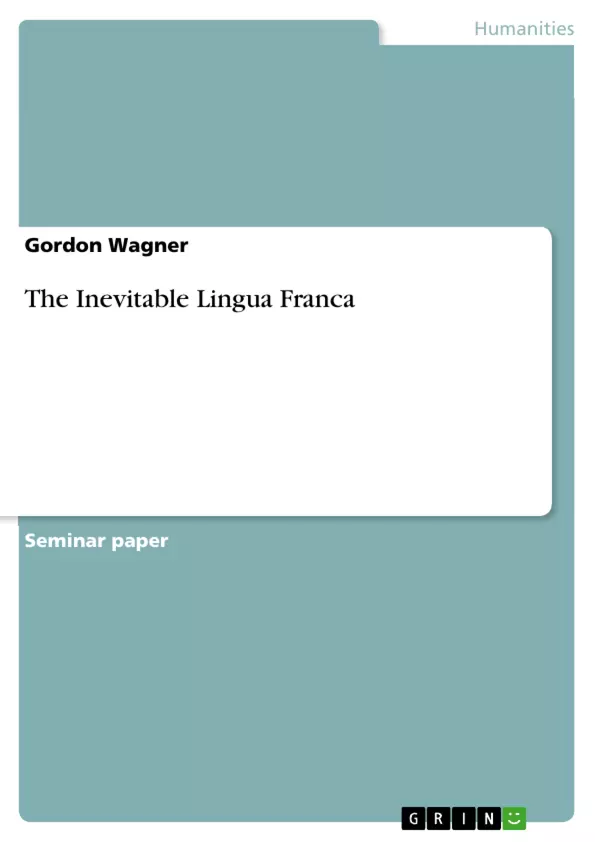A typical native German is likely bound to grow up using her/his mother tongue which is inevitably about to frame her/his identity as a German as it probably is the case with a native U.S.-American having English as her/his mother tongue. So what about a common European identity? Can there possibly be one – and if so, how would it look like?
If language plays such an important role in forming one’s identity – which we will assume for now – how come there are people born in Europe who rather consider themselves European than (e.g.) German, French, Finnish or Slovakian, etc.? Furthermore, is there a so-called lingua franca existing in Europe – and what would it be? Also, would this lingua franca be necessary to further impel European integration, if not even help to unite the European countries and possibly create a European identity?
Inhaltsverzeichnis (Table of Contents)
- The Inevitable Lingua Franca
- The European Identity
- The French and Swedish Models
- Conclusion
Zielsetzung und Themenschwerpunkte (Objectives and Key Themes)
The essay explores the concept of a European identity, particularly through the lens of language. It seeks to analyze the potential for a lingua franca in Europe and its implications for European integration.
- The role of language in shaping national identity
- The challenges and opportunities of linguistic diversity within the European Union
- The potential for English to become the lingua franca of Europe
- The impact of immigration and multiculturalism on European identity
- The need for a balance between national identities and a sense of European unity
Zusammenfassung der Kapitel (Chapter Summaries)
- The essay begins by exploring the challenges of linguistic diversity within the European Union, highlighting the cost of translation and the impact on European citizens. The author also delves into the potential for a lingua franca in Europe and its role in fostering a common European identity.
- The second section focuses on the concept of European identity, examining the historical and cultural factors that shape it. It considers the role of common values, such as Roman law, Judeo-Christian ethics, and Enlightenment rationalism, as well as the potential for these shared experiences to unite Europeans despite their differences.
- The third section delves into the comparison between France and Sweden, two countries with vastly different approaches to language within the EU context. The author examines the French resistance to the decline of their language's significance and the Swedish acceptance of their language's minority status. The chapter analyzes the arguments for and against the adoption of English as the lingua franca of Europe.
Schlüsselwörter (Keywords)
Key words and focus topics of the essay include: European identity, lingua franca, language and national identity, multiculturalism, European integration, English as a global language, French language, Swedish language, EU institutions.
Frequently Asked Questions
What is a "lingua franca"?
A lingua franca is a common language used for communication between people who do not share a native language, such as English in the European Union.
How does language shape national identity?
Language is often the primary frame for identity; for example, a native German's identity is inevitably tied to the German language.
Is there a common European identity?
A European identity is emerging based on shared values like Roman law, Judeo-Christian ethics, and Enlightenment rationalism, despite linguistic differences.
How do France and Sweden differ in their language policies?
France often resists the decline of French, while Sweden more readily accepts its language's minority status and the use of English as a global tool.
Why is a lingua franca necessary for European integration?
It reduces the massive costs of translation and helps unite diverse countries by providing a shared medium for political and social discourse.
- Quote paper
- Gordon Wagner (Author), 2011, The Inevitable Lingua Franca, Munich, GRIN Verlag, https://www.grin.com/document/171584



